
Collection of media revolving around the Thylacine
149 posts
Latest Posts by moonlight-wolf-archive - Page 2

Don't You Forget About Me
Prints and shirts available here



-Top pictured is one of the Burrell photographs. Which were edited to be close ups to depict a 'thylacine in the wild' later debunked to be a captive thylacine.
-Middle pictured is the Wilfred batty thylacine which is the last recorded thylacine shot in the wild.
-Bottom pictured is the Beaumaris zoo family group.
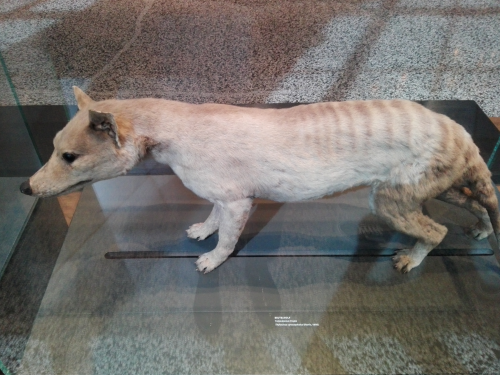
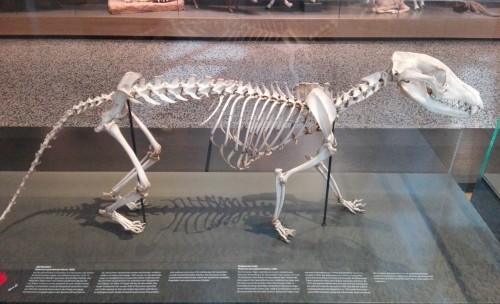
just remembered they had both a thylacine mount AND skeleton in the museum in darmstadt so i needed to show you all!





Don't even get me started they have a Thylacine at the museum and it was the most beautiful thing I have ever seen
This is my favorite photo of them


three female thylacine one with a amputation forefoot
They are friends
(idk when yellow footed rock wallabies first broke off into an individual species, but perhaps Thylacinus Cynocephalus was on the mainland then)

Also I found the resource I've been looking for to make that art project of thylacinid family tree.
OH GAWD *dying sounds* ARCHIVE DID... DID YOU POST NON THYLACINE STUFF ON YOUR THYLACINE ARCHIVE ACCOUNT??!! OH OH GOD


The bottom is gonna be a button :D
You know what? That's it.
**Tasmanians your tiger**

Lonely Benjamin






Here is the Smithsonian thylacine as it currently appears in the museum’s Hall of Mammals. This individual was a female that lived at the National Zoo in Washington, D.C. from 1902 to 1904. She was carrying three pouch young upon her arrival, two of which survived to adulthood (a male and a female, pictured here). Thanks to this little family, the Smithsonian has an impressive collection of thylacine material, but only the mother’s mounted skin is viewable by the public.
Unfortunately, this lovely specimen is displayed behind a fabric curtain in an effort to drive home the concept of extinction. If you go around the side of the display, you can barely catch a glimpse of her rear end.
The exhibit claims that the dingo was responsible for the thylacine’s extinction on mainland Australia, which occurred about 2,000 years ago. New research suggests that the dingo was not really to blame; rather, a changing climate and overhunting by growing Aboriginal populations were the likely causes. [x]
In case you’re curious, here’s a rare “pre-curtain” photo from Flickr:

For more information about the Smithsonian thylacine and her legacy, click here.

This is a portrait of them done at the national zoo in Washington DC by Gleeson.
She is thought to be depicted as the Joey in the pouch as at the size and predicted age the mother would not allow the Joey into the pouch so it was suspected the mother allowed her because she was sick. Poor baby. She passed in September when the family arrived in July.
![Juvenile Female Thylacine Skin And Skull From The Smithsonian NMNH (USNM 115365). [x]](https://64.media.tumblr.com/9e01320d77496a79adccb09866a85d96/d4b25c997d778263-6b/s500x750/bfc1cc9e9750f571c1dd04549ad21553757927c0.jpg)
![Juvenile Female Thylacine Skin And Skull From The Smithsonian NMNH (USNM 115365). [x]](https://64.media.tumblr.com/e6cb19511ab8fbe6d9fe941baca53834/d4b25c997d778263-b0/s500x750/01db45584bf77727e7821ed229bdb44e7be739a0.jpg)
Juvenile female thylacine skin and skull from the Smithsonian NMNH (USNM 115365). [x]
This individual was one of three pouch young that arrived along with an adult female; sadly, she was the only one of the joeys that did not survive to adulthood. She died in 1902 shortly after her family’s arrival at the National Zoo.
Size comparison of this skin to a full-grown adult (actually her male littermate) below from @thebrainscoop [x]. So smol :’(

Hi!!! I baguely remember a photo of a thylacine with a joey poking out of the pouch and it stuck with me a lot because it surprised me to learn their pouch opened backwards, but I can't for the live of me to find it. Do you perhaps have it around? Thank you!!
Hello! Thank you for the ask!
I have a few ideas what the photo you are looking for might be.
First is the Buckland and Springbay mother and pups photo. This was a taxidermy that was later destroyed, however portrays a joey emerging from the pouch:


Next is the family group from the Washington zoo:

(portrait done by Joseph M Gleeson of the Washington zoo family)
This was a mother and 3 Joey's that were brought into the national zoo in Washington DC. The Joey in the pouch ended up passing away in September unfortunately.
Beaumaris zoo group:
This was a mama with an extended pouch from four Joeys. In the film where the keepers are getting them into the den for the night her pouch is easily seen moving as she walks.



Lastly pictographs:

These are a collection of pictographs from around mainland Australia that depict Thylacinus Cynocephalus. Note the two middle on the left that have an extra tail, showcasing young in the pouch.

This doesn't show the pouch but it's one of my favorites.
If none of these are it and you have more ideas on what the picture may be let me know! Send as many asks as you'd like! As far as I know I'm aware of all or at least the majority of thylacine media.
I spend a lot of time in archives *sob*
Here are some more thylacine recolors for y'all!!

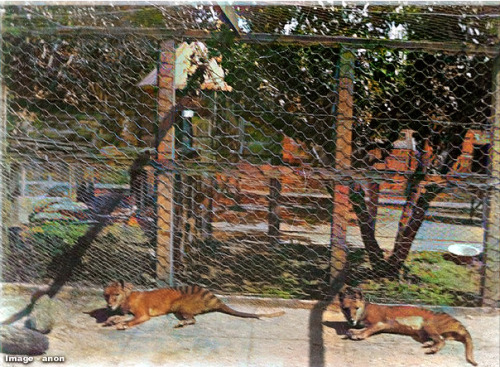

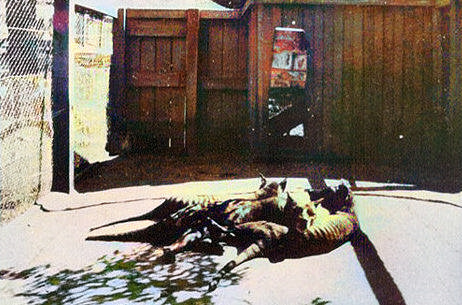

This photo, thought to be from the 1880s/1890s, is one of the earliest to show a thylacine. In it, a mother is posed at rest, curled around her joeys, one of which is nestled in her pouch. This taxidermy set represents the only known mount of a mother thylacine and her young, and despite its pricelessness, was supposedly destroyed in 1935. [ x ]
Thought y'all might enjoy this.
I used an app to recolor black and white photos of thylacines.
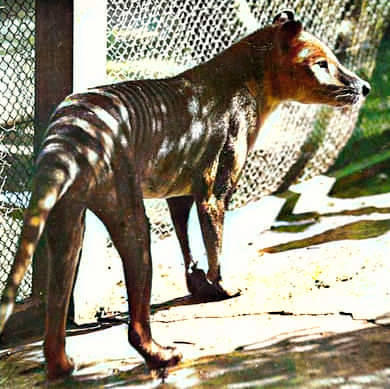
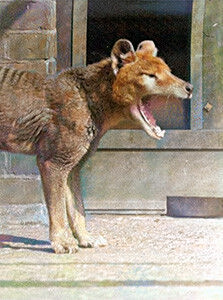
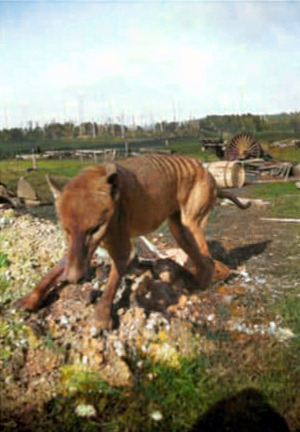
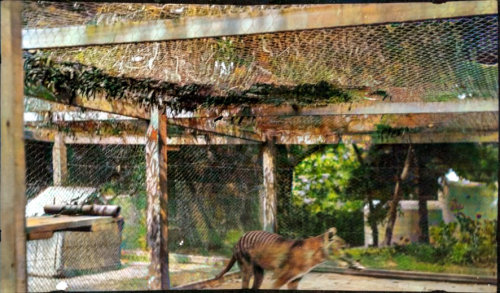

W.D. & H.O. Wills cigarette card featuring “Tasmanian Wolf”, circa 1890-1915.

Illustrated Sketches of Natural History: Consisting of Descriptions and Engravings of Animals. Second Series. 1864.
Internet Archive
"Thylacine Song" by Jocean
Everytime I see this I exhale deeply XD
It's Sept 7th, which means that Benjamin gets to be dead, his favorite activity

The central continent of my worldbuilding world is dominated by marsupials and monotremes, and birds. There are several species of thylacine, and one — which is essentially our Thylacinus cynocephalus — is domesticated.
They are a recent domestication, with about 250 generations having passed. Compared to the wild ancestors, they have similar builds, but with more colours, variation in size, and longer lifespans (12-20 years). They have lost their natural reclusive nature and though shy, are friendly and inquisitive and trainable to a point. Most prefer to be solitary or tolerate the presence of 1-2 others, though get along well with other calm-tempered species. Their prey drive is greatly reduced but many suffer anxiety in loud or busy environments.

A taxidermy mount of a male thylacine, donated by the Macleay Family and currently part of the Chau Chak Wing Museum‘s collection. Going by its display card, it’s possible the animal was shot by a William Petterd (1849-1910) in Tasmania in 1875. [ x ]
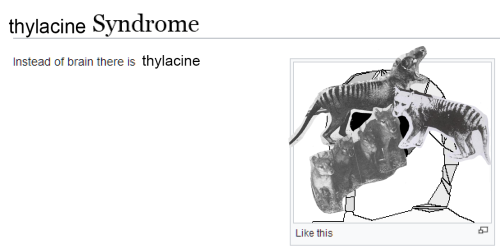
i feel normal about thylacines why do you ask

The thylacine, also known as the Tasmanian tiger, is not a tiger. Nor is it a dog, a fox, or a wolf. It is an extinct carnivorous marsupial…

The Tasmanian Wolf in Walter P. Dando, More Wild Animals and the Camera, photographer Dando (1913) - 9789004186729.
Moonlight wolf
Haha get it?


General Zoology. Written by Mary J. Guthrie and John M. Anderson. 1957.
Internet Archive
When she says:
"I'm fine"
What she means:
"I just spent the past 3 hours comparing that new thylacine pelt specimen to thylacine photographs and documents."

BRUH????
Haha that's cool I like this theory
(Also note: no shade to you op. that taxidermy was made super inaccurately, they could kinda stand on their tails but not like a kangaroo like in that taxidermy stance)
But I love this!! I definitely think he might be a Thylacine now XD

Tigger is not a tiger.


He’s a thylacine. Thylacinus cynocephalus. Also known as the Tasmanian wolf or Tasmanian tiger.
Sounds like a bold claim to make? Let’s look at the facts.
Keep reading




